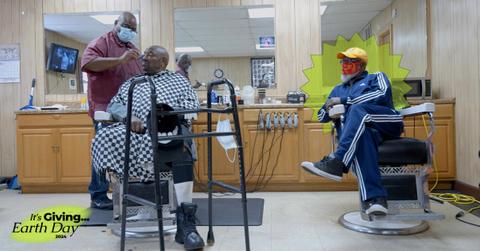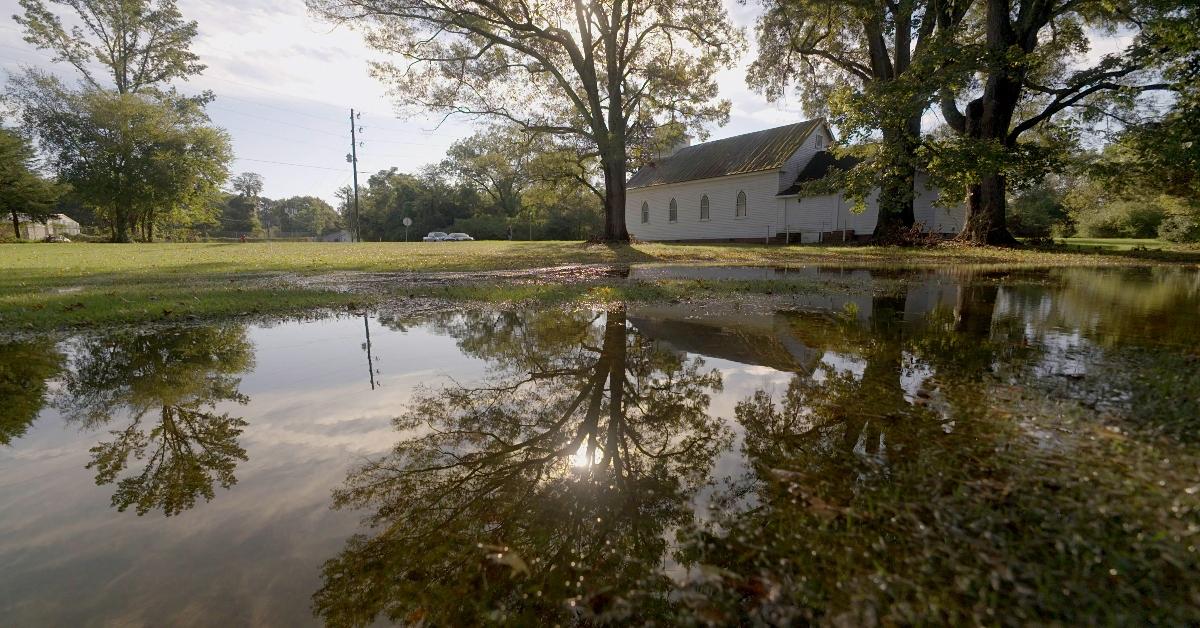It's Giving... Climate Justice: Exploring Environmental Racism in the First Town Founded by the Formerly Enslaved (Exclusive)
"I hope, after watching the film, that people understand there is no one coming to save your community but you."
Published April 22 2024, 11:06 a.m. ET

Princeville residents enjoy a haircut at the oldest barbershop in town.
How do we preserve American history — recognizing the suffering and discrimination weaved into it — while simultaneously making progress in a world that still devalues and harms marginalized communities?
This is explored in Emmy-winning filmmaker Resita Cox's powerful documentary Freedom Hill, which begins streaming on Monday, April 22, 2024, in honor of Earth Day — and below, we're sharing an exclusive interview with the director and an exclusive clip from the film ahead of its premiere.
In 1865, Freedom Hill was established on boggy land along North Carolina's Tar River, land once deemed "uninhabitable" by white Americans. After the Civil War, formerly enslaved Africans saw an opportunity to prosper, settling and nicknaming the land Freedom Hill, making it "the first town in the United States chartered by formerly enslaved Africans," according to Cox. It was later renamed Princeville, N.C.

Marquetta’s mother, Sylvia Perkins Davenport, and cousin Brenda Hunter reminisce on the 99 flood that nearly washed away their grandmother’s home.
Because Princeville sits along a floodplain, centuries of flooding erode the land, quite literally erasing it. Plus, the Tar River's waters have been rising since the early 20th century, as noted by The Washington Post.
But these destructive events in Princeville are "man-made disasters and not natural disasters," Cox says. "I learned all of that — and that the birthplace of the environmental justice movement is right here in North Carolina — while making Freedom Hill."

'Freedom Hill' director Resita Cox
'Freedom Hill' director Resita Cox on climate crisis realities: "Climate change is largely a minority, a Black and Brown, a poor issue."
Freedom Hill is part of the 16th season of acclaimed independent documentary series AfroPoP: The Ultimate Cultural Exchange.
"It’s important for [AfroPoP] to include a film that focuses on the impact of climate change through the lens of Black people because if we as a society, as a planet, as a human race, hope to stand a chance against the current climate crisis then we must begin by looking at the people who have already been harmed," says Cox, who grew up in Kinston, N.C., just an hour from Princeville.
Cox first learned of how symptoms of climate change have ravaged the community when she was sent as a WCTI/News Channel 12 reporter to cover the flooding.
According to NC Newsline, Princeville has endured at least eight major floods over the last 150 years, including 1999's Hurricane Floyd and 2016's Hurricane Matthew.
Glenda Knight, Princeville’s town manager, told The Washington Post that Princeville had 2,300 households before Hurricane Matthew, and just 1,592 after.
Though Cox grew up "surviving the same floods you see in Freedom Hill," it was the making of her film that taught her why Black communities often get hit the hardest by climate change.
"The reason why Black communities were located where they were is directly correlated to the legacy of slavery and where Black people were allowed to settle once we freed ourselves after the Civil War," she explains. "Black people, Black communities, are on the forefront [of the climate crisis] and are still in the most vulnerable places."
A 2006 article in the journal Geographical Review exposes how U.S. Southern housing markets "tend to segregate minorities in low-lying, flood-prone, and amenity-poor segments of urban areas."
"The people who have created the conditions for our planet to be harmed have also created conditions where they don’t have to deal with the impact of their harmful activities," Cox maintains.

A church sits in a damp lot after heavy rainfall in Princeville.
Check out this exclusive clip from 'Freedom Hill,' shared with Green Matters ahead of the premiere.
Though it's easy to look at neglected towns like Princeville with an air of melancholy, Princeville still represents Black resilience and the power of community.
Cox feels her documentary highlights environmental racism "in a way that is poetic and palatable, that focuses on our humanity," as she believes "that is the way we cut through the noise and get people to pay attention."
"If there is a problem in your community, you can do something about it. We are the ones we have been waiting for," she adds. "I want people to take away from this film that our history is worth protecting and our communities are worth advocating for."
Freedom Hill premieres for free on Monday, April 22, 2024, at 8 p.m. ET on WORLDChannel.org, the WORLD YouTube Channel, the PBS app, and various public TV stations via PBS Plus.
This article is part of Green Matters’ 2024 Earth Day programming, It's Giving... Earth Day: A series about the people and organizations who are “giving” Earth Day 24/7. We hope these stories inspire you to embody the spirit of Earth Day all year round.